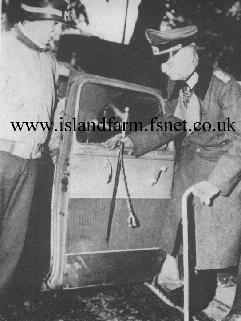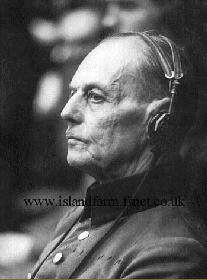
Generalfeldmarschall Gerd Von Rundsted…Continued…
 |
|
German
Officers line up as a salute to Rundstedt as he departs for the
Nuremburg War Trials
|
 |
 |
The British
soldiers were responsible for Von Rundstedt as far as the French coast. He was
then handed over to the American Forces. The American soldiers interrogated
Von Runstedt to make sure that he would give all the necessary information at
the trials. He was apparently subjected to physical violence which deeply
affected him and when he came back from France he was said to have aged considerably.
Message
from Brett Exton:
I have often
received emails from people wishing to know more about the "physical violence"
von Rundstedt was alleged to have been subjected to. In 2005, Matthias von Rundstedt
(great-grandson) wrote to me with the same interest. Matthias decided to look
into it and wrote me the following:
My research
has led me to find (some of the time through his own personnal diary), that
many prisonners were beaten when they did not give a specific answer to their
interrogators. I do not believe that he suffered much, except for the odd punch
and kick, and once being refused access to a restroom until he answered them
"correctly". However, I have come to believe that he "aged considerably" because
of a second heart attack that he suffered whilst at Nuremberg, probably down
to the stress of the interrogations. Do not forget, he was also quite ill with
his leg at the time. He was also someone that worried "on his own", and it was
for that same reason that he suffered his first heart attack in 1941, whilst
pondering over the Russian Front.
GFM von
Rundstedt's testimony at the Nuremberg trial on 12 August 1946.
You can find it at: http://www.nizkor.org/hweb/imt/tgmwc/tgmwc-21/
(Session 201, 12 August 1946).
Here are two extracts that say a lot about his attitude to an overthrow of Hitler and his views on the conduct of the senior officers of the German Army (von Rundstedt is "A" of course!):
Q.
Did you or other Commanders-in-Chief attempt to stop the continuation of the
war when you regarded it as lost?
A. Both Field-Marshal Rommel and I attempted twice to persuade Hitler
to change the conduct of the war and especially to withdraw the front to the
German frontiers. But, as was to be expected, these suggestions were not heeded.
Q.
Since Hitler refused to listen to such advice, did you not consider his overthrow?
A. I would never have thought of such a thing, that would have been base,
bare-faced treachery, and could not have changed the situation. The Army and
the people still believed in Hitler at that time, and such an overthrow would
have been quite unsuccessful. Even if I, perhaps with the aid of the Allies,
had brought about an overthrow, the fate of the German people, according to
the famous statement of the Big Three, would have been exactly what it is now,
and I would have emerged and been considered for all time as the greatest traitor
to my Fatherland.
Q. Now I come to the last question. You know, Field-Marshal, that the
prosecution has asked that the body of military leaders be declared criminal.
As the senior officer of the German Army, you know the attitude of these leaders
toward military and International Law. Would you please tell the Tribunal about
it briefly?
A. The rules of warfare and of International Law as set down in the Geneva
Convention and the Hague Rules on Land Warfare were always binding for us older
leaders. Their strict observance by the troops was demanded, and very severe
measures were taken in case of excesses which in war can probably take place
in all armies. The court-martial records of the various divisions can give information
on this point. Property of the inhabitants was ordered to be respected. Severe
punishment for plundering had to be meted out, if only in the interests of maintaining
discipline amongst our own troops. Raping of women and other inhuman acts were
also subject to severe punishment. What we could do to support the inhabitants
of enemy countries affected by the war was done, as far as was possible. The
wounded or conquered enemy was no longer considered as such, but had a claim
to decent treatment. We ordered that the battle itself was to be fought chivalrously.
We old officers who lived through the time of cavalry battles and of infantry
bayonet attacks witnessed the increasing mechanisation of warfare with regret.
Today the bravest men and the best troops are helpless against the force of
mechanisation. All the more did we leaders believe that where there was fighting
on land the old soldierly, decent forms of battle should be maintained, and
that they should be impressed on the troops again and again. As senior soldier
of the German Army, I will say this: We accused leaders were trained in the
old soldierly traditions of decency and chivalry. We lived and acted according
to them, and we endeavoured to hand them down to the younger officers.
 |
|
5th July 1946 at Bridgend railway station after attending the Nuremburg War Trials
|